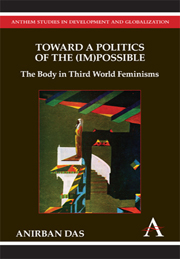Book contents
- Frontmatter
- Contents
- Acknowledgements
- Introduction
- 1 Body, Power and Ideology
- 2 Thinking the Body: Metaphoricity of the Corporeal
- 3 Thinking the Body: Negotiating the Other/Death
- 4 Thinking the Body: Beyond the Topos of Man
- 5 Violence and Responsibility: Embodied Feminisms
- In Conclusion: Toward a Politics of the (Im)Possible
- Notes
- Bibliography
- Index
5 - Violence and Responsibility: Embodied Feminisms
Published online by Cambridge University Press: 05 March 2012
- Frontmatter
- Contents
- Acknowledgements
- Introduction
- 1 Body, Power and Ideology
- 2 Thinking the Body: Metaphoricity of the Corporeal
- 3 Thinking the Body: Negotiating the Other/Death
- 4 Thinking the Body: Beyond the Topos of Man
- 5 Violence and Responsibility: Embodied Feminisms
- In Conclusion: Toward a Politics of the (Im)Possible
- Notes
- Bibliography
- Index
Summary
Introduction
A common allure and risk of academic writing is to treat theoretical arguments as transparent and belonging to obvious ‘positions’ marked by a certain proper name (Foucault, Derrida, Marx) or a denotative common noun (structuralism, phenomenology, hermeneutics). It is as if one need not engage with the specific dynamics of the proposition, once the ‘lineage’ is properly established for all to gloss readily over. Of course, the elementary trainings of writing continue to deal with this as a simple problem, as something s/he has to bear with if one wants to enunciate anything clearly and without ambiguity, a small trick of the trade. Does this innocuous operation indicate something more? Does it point at a concealed commitment to a very specific – albeit dominant and ubiquitous – mode of thinking, being and/or doing? A manner of working with concepts in which the history of the uses – to which a word has been put to – is erased at the moment when the ‘meaning’ of the word is fixed. A forgetting of the fact that these other past/present/future uses shape the shades of its meaning as much as its present intended use. Paleonymy – the traces of the history of the uses that cling tenaciously to words – is the expression Spivak (1993) uses to mark this forgotten phenomenon. Throughout this chapter, when I discuss certain ‘positions’ I try to address the specific nuances of their enunciations, to attend to the paleonymy of utterances, and not to chart them along pre-given classificatory grids.
- Type
- Chapter
- Information
- Toward a Politics of the (Im)PossibleThe Body in Third World Feminisms, pp. 133 - 162Publisher: Anthem PressPrint publication year: 2010

